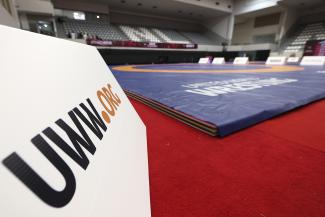Commonwealth Games prove pivotal for women referees
Thursday, August 11, 2022 - 13:42 By United World Wrestling Press

BIRMINGHAM, England (August 11) -- Under the leadership of Edit Dosza and Antonio Silvestri, wrestling at the 2022 Commonwealth Games broke barriers and continued to push United World Wrestling's objective to achieve gender equality.
The two-day competition at the Games was an important stage in UWW's continued development of women officials. It was a pivotal moment in herstory, as it was the first time female referees were the majority at a wrestling competition.
Of the 21 officials in attendance, 16 female referees participated in Birmingham, seven of which have the highest category (IS). At the same time, nine were participants from the first women‘s course which was held in in Antalya earlier this year.
The Commonwealth Games were a great success for female referees and an excellent experience for everyone involved. The matches went smoothly, giving a lot of hope for the future of female referees. The Games have undoubtedly inspired future girls and women to find their path in wrestling as an official.
The next step for the female referees of the women‘s developmental program is the World Championships. Next year, the work will continue, and the schedule will be published soon.


Share your thoughts.
Comments